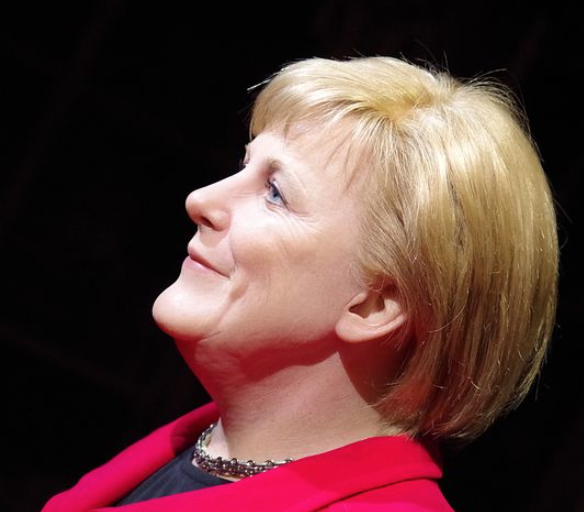German election: Merkel safe but don't underestimate the right-wing populists
Courtesy of Katharina Karcher, University of Bristol
 The statistics are clear: the latest polls anticipate victory for Angela Merkel’s Christian Democratic Union (CDU) (36-38%) in the impending German election. They also forecast a weak result for her opponent Martin Schulz and his Social Democratic Party (SPD) (20-24%).
The statistics are clear: the latest polls anticipate victory for Angela Merkel’s Christian Democratic Union (CDU) (36-38%) in the impending German election. They also forecast a weak result for her opponent Martin Schulz and his Social Democratic Party (SPD) (20-24%).
This enables Merkel to remain as chancellor, and she could choose between a coalition with the SPD or with two of the smaller parties.
When it comes to junior coalition partners, there is plenty of choice. The leftist party Die Linke, the Greens, the liberal Free Democratic Party (FDP), and the right-wing populist party Alternative for Germany (AfD) are all expected to secure the 5% of votes needed to enter parliament. Merkel has ruled out working with Die Linke and the AfD but has kept all other options open.
With a few exceptions, the polls predict that the AfD vote share will be in the single digit percentage area. Unfortunately, it’s quite possible that they are underestimating the appeal of the populist party. It has been 28 years since the fall of the Berlin Wall but Germany remains divided.
A growing part of the German population feels left behind and disillusioned with mainstream politics. In this context, a vote for a party with a populist anti-establishment and anti-immigration stance is a small but powerful sign of political protest. One of the last polls before the election predicts that the AfD results will be in the low double-digit range. I think we must brace ourselves for the possibility that the AfD will be the third strongest party in the German Bundestag.
Is it all Merkel’s fault?
In 2015, Merkel took the controversial decision to open the German borders to hundreds of thousands of refugees. Although she faced harsh criticism for this decision, the chancellor refused to back down, even in the wake of the recent series of terror attacks.
Behind the scenes, though, she has made a number of concessions. While she continues to insist that Germany has to welcome refugees, she is now keen to add that asylum seekers from so-called “safe countries of origin” have to be deported as fast as possible , and she wants to prevent further refugee flows.
Although Schulz’s position on immigration and refugee protection is surprisingly similar to Merkel’s, he has missed no opportunity to criticise her handling of the refugee crisis. Another leading member of the SPD, foreign minister Sigmar Gabriel, went as far as to claim that Merkel is “partially to blame” for the rise of the AfD.
It’s hard not to think that Schulz and his party colleagues attack Merkel to divert attention away from their own problems. Like other social democratic parties in Europe, the SPD is experiencing an existential crisis. In 2003, the SPD introduced a series of austerity measures that have contributed to the social and economic marginalisation of millions of people. Although Schulz promised to rescind some of these reforms, many people feel that the proposed changes do not go far enough to justify Schulz’s claim that he stands for social justice.
The great re-brand
It’s worth looking out for how the liberal FDP does in this election, too. Founded in 1948, the party has been represented in the Bundestag since 1949 and has participated in coalition governments with the Social Democrats and the Conservatives. In the elections in 2013, the FDP was dealt a heavy blow and lost all of its seats in parliament. To avoid a similar disaster this time, the party hired experts. The advertising agency Heimat was commissioned to give the party a radical pre-election makeover.
The result has been a glossy poster campaign featuring black-and-white photographs of the party’s top candidate Christian Lindner and slogans in the new party colours, yellow and magenta. The pictures were taken by star photographer Olaf Heine, who is known for highly stylised portrait photographs of musicians and athletes such as Rammstein, Iggy Pop, Dirk Nowitzki and Bastian Schweinsteiger.
The campaign quickly drew ridicule and accusations that Lindner looked more like he was advertising menswear than running for office. Unusual campaign slogans like “Digital first. Think second” and “Impatience is also a virtue” were also mocked. Despite this, the campaign seems to work. Although there have been no significant changes in the party’s programme, the FDP’s return to the Bundestag looks now very likely. With a bit of luck, the FDP could even make it back into government.
![]() No matter what happens to the FDP, Angela Merkel will probably stay in office. But this doesn’t mean that she can return to business as usual after this historic election. For the first time since 1945, a far-right party will be represented in the Bundestag. Leading party members make racist remarks, deny the Holocaust, and some are charged with sedition. How members of the Bundestag, journalists and citizens respond to this challenge will show what, if any, lessons about democracy have been learned in Germany since World War II.
No matter what happens to the FDP, Angela Merkel will probably stay in office. But this doesn’t mean that she can return to business as usual after this historic election. For the first time since 1945, a far-right party will be represented in the Bundestag. Leading party members make racist remarks, deny the Holocaust, and some are charged with sedition. How members of the Bundestag, journalists and citizens respond to this challenge will show what, if any, lessons about democracy have been learned in Germany since World War II.
Katharina Karcher, Lecturer in German, University of Bristol
This article was originally published on The Conversation. Read the original article.



